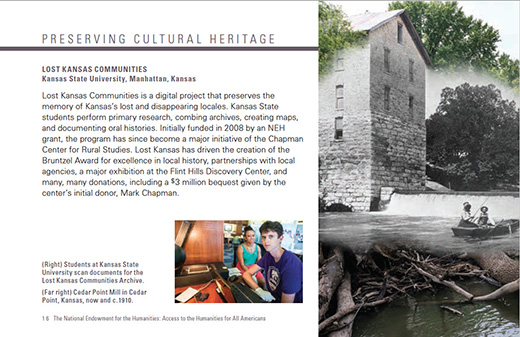Chapman Center for Rural Studies featured in National Endowment for the Humanities promotional campaign
Friday, Oct. 20, 2017

Lost Kansas Communities, a project by Kansas State University's Chapman Center for Rural Studies, is featured in a new National Endowment for the Humanities brochure that highlights the endowment's primary goals.
| Download this brochure.
MANHATTAN — The Chapman Center for Rural Studies at Kansas State University, directed by Bonnie Lynn-Sherow, associate professor of history, has been selected as one of 15 "high impact" National Endowment for the Humanities recipients by the National Humanities Alliance.
The center is featured in a new National Endowment for the Humanities, or NEH, brochure that will be distributed to members of Congress and donors nationwide.
In addition, the center, an interdisciplinary undergraduate research center in the university's College of Arts and Sciences, is one of five featured units on the alliance's new website, nehforall.org. This interactive site helps users find NEH projects in their respective states.
The featured projects and programs illustrate the endowment's primary goals, including engaging youth, reaching rural communities, serving veterans, catalyzing local tourism and preserving cultural heritage. The Chapman Center for Rural Studies is noted as an institution safeguarding the country's historical and cultural legacies.
The brochure and website feature the center's Lost Kansas Communities project, a digital archive of the state's lost and disappearing places. Students comb through archival information, create maps and collect oral histories to ensure the stories and people of Kansas' small towns are not forgotten. Student research recently supported a major exhibition at the Flint Hills Discovery Center from September 2016 through January 2017.
The center's maintains digital archives of its research projects at k-state.edu/history/chapman/.
Cecily Erin Hill, director of the National Humanities Alliance, called Lost Kansas Communities an incredible project and thanked the center for its work to preserve cultural heritage and make it publicly accessible.
The alliance is an advocacy coalition dedicated to the advancement of humanities education, research, preservation and public programs. It is supported by more than 170 national, state and local member organizations and institutions.
The NEH was established in 1965 in recognition of the unique role the humanities play in fostering the wisdom, vision and knowledge required to participate in a thriving democracy.
